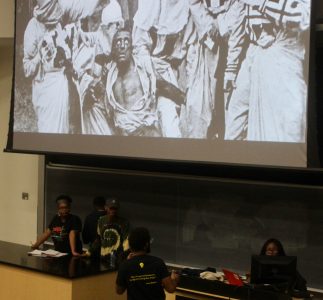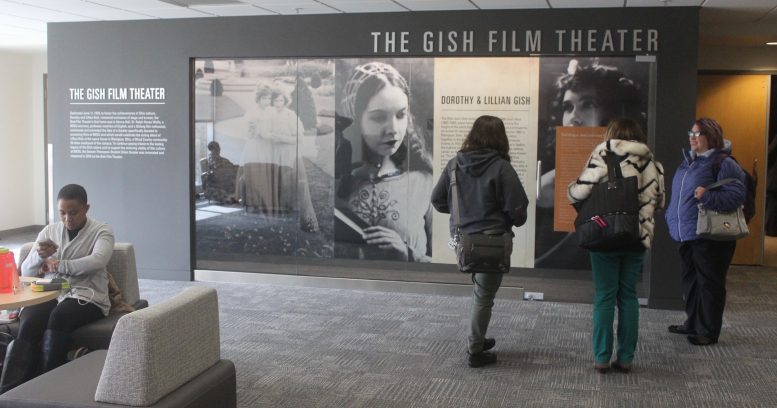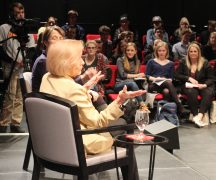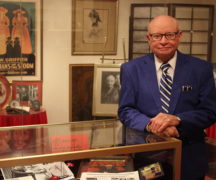By DAVID DUPONT
BG Independent News
When “The Birth of the Nation,” originally called “The Clansman,” was released in 1915 it was a blockbuster, the first blockbuster movie.
President Woodrow Wilson screened it at the White House, the first film shown in the White House, and then gave it a rave review.
The film’s vicious depiction of African-Americans sparked civil unrest, including anti-black violence.

The nascent NAACP protested and campaigned to have it banned, and it was in two states, Ohio and Kansas.
The Ku Klux Klan liked Griffith’s film so much it used the movie as a recruiting tool. That helped the Klan, once dormant, become more powerful and widespread, extending into the North including Wood County.
More than 100 years later, the film is still stirring controversy.
The Black Student Union at Bowling Green State University has questioned the name of the venerable Gish Film Theater.
The theater, then in Hanna Hall, was named for Lillian and Dorothy Gish in 1976, after Lillian Gish received an honorary doctorate and visited campus. Lillian Gish, an Ohio native who made her stage debut in Risingsun, was a star of “Birth of Nation,” and a close associate of D.W. Griffith, the director and producer of the film.
The move of the theater from Hanna Hall, itself controversial, to the Bowen Thompson Student Union gave the name more prominence. Kyle Thompson, political action director for the Black Student Union, said that visibility sparked the call for considering changing the name.
The scheduled March 29 rededication of the theater, featuring Oscar-winning actress and BGSU graduate Eva Marie Saint, who worked with Lillian Gish in 1953, has been canceled. Saint is still scheduled to appear on campus at that time.
President Rodney Rogers has asked Dean Raymond Craig, of the College of Arts and Sciences, to form a task force to study what if any action the university should take and report to the board of trustees in May.
Last week, the Black Student Union organized a town hall meeting to elicit comment from all sides in the controversy.
Thompson set the tone. “Keep in mind there are other voices in the room,” he said. “Respect each other. Please, at the end of the day, remember we’re all humans, and we all have emotions. We have to validate those and understand that this is a very touchy topic”
He said the BSU’s call for action was aimed at creating “a better and safer campus.”
“This is essentially like having a Confederate statue on campus,” he said.
Tierah Townsend said that the Gish shouldn’t be in the union, which should be welcoming for all students. “BGSU prides itself as being a campus full of diversity and inclusion.”
BGSU student Brandon Seifert argued that this had to be looked at in the context of the time it was created. Just about every public figure back in 1915 held views on race that would now be considered racist, he said.
“Are we to go on a witch hunt through history defaming and erasing the names of influential figures because they held the popular opinion of the time, no matter horrible that opinion may be?”
Gish was an actress playing a part, and actors often play controversial roles, Seifert said.
Gish, who died at 99 in 1993, became known as the first lady of American cinema. “She is an inspiration for actors around the world.”
His remarks drew a smattering of applause from the 80 or so at the meeting.
Charis Hoard, a student in psychology, said this should not be looked on as an attack on Gish, but instead a critical look at the issue now.
To understand the context, said Ross Martin, should not preclude looking at it differently.
Even in 1915 when the film was released, people knew it was racist, said Nicole Johnson. “There were people who stood up. People did know better.”
Sadi Troche said the film’s relationship to the rebirth of the Klan cannot be overlooked.
Movies can empower people. She cited “Black Panther” and its positive impact on black youth.
But “Birth of the Nation,” she said, “actually created more murders, more pain, more genocide in the United States…. That’s the biggest issue.” The debate is not about the views of people who created it “but what the movie caused.”
Kyron Smith, president of the BSU, said the issue was bigger than the Gish Theater. “It’s not that we’re going on a witch hunt,” he said. “These lies have been here. … There’s a lot of racism in our past and a lot of that’s been covered up. Let’s get the truth out. This is our chance to move forward. Lies shouldn’t be covered up.”
Though the BSU’s distaste for the name was evident, so was the officers’ intention to hear all voices.
One student spoke about the importance of continuing to honor Gish and not change the name of the theater.
“You’re not the only one who thinks that,” Smith acknowledged.
Cynthia Baron, a film scholar and professor in the Department of Theatre and Film, said there were two conceptions of the problem. One looks “at the good with the bad,” and another advocates “respecting everyone’s humanity.” The first, she said, ends up in “whitewashing” the problem.
“I think it would be productive to change the name,” the professor said.
Smith said that top administrators had indicated they would attend, but were asked not to because the students wanted to the lead the effort. There is support for the BSU in administration, he said.
In a statement to the campus community last week, President Rodney Rogers wrote: ” I can unequivocally affirm that the values and the views expressed in the film do not align with those of Bowling Green State University.”
A statement to that effect has been posted at the theater.
Throughout the meeting, suggestions made and recorded on how to address the problem.
There were about a dozen beyond changing the name.
One called for using the display windows, now featuring photos of the Gish Sisters — but none from “Birth of the Nation” — to have student work screened.
Another suggestion was to retain the name but move the theater.
One was to regularly screen “Birth of a Nation” as an educational tool. Another was a suggestion for using the controversy to launch a broader educational experience.
Acknowledging that most students have never seen “Birth of the Nation,” Johnson said. “We certainly need to educate them. … We need to show them this is wrong.”





